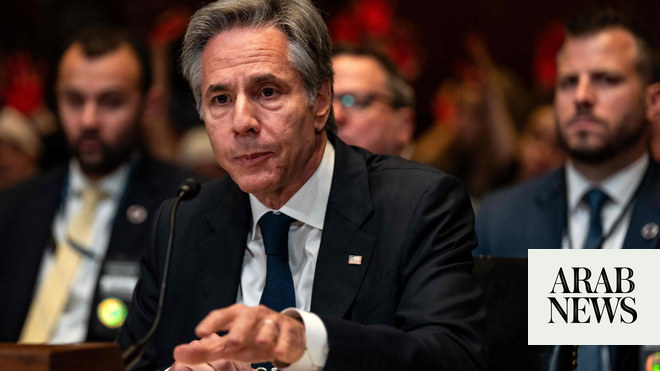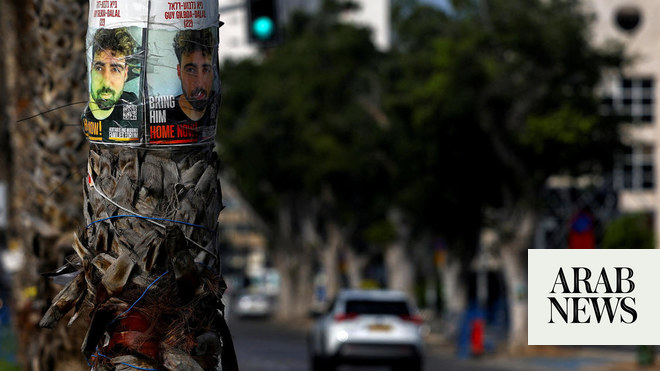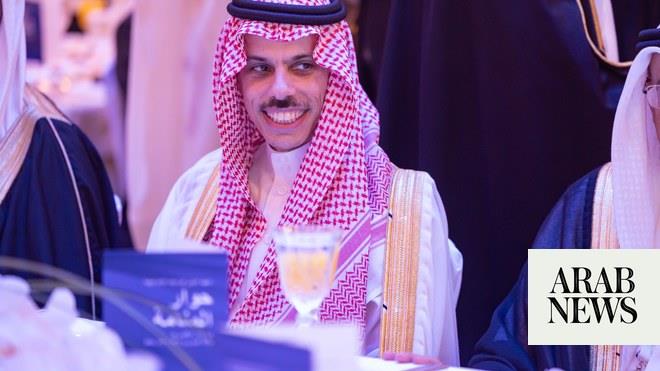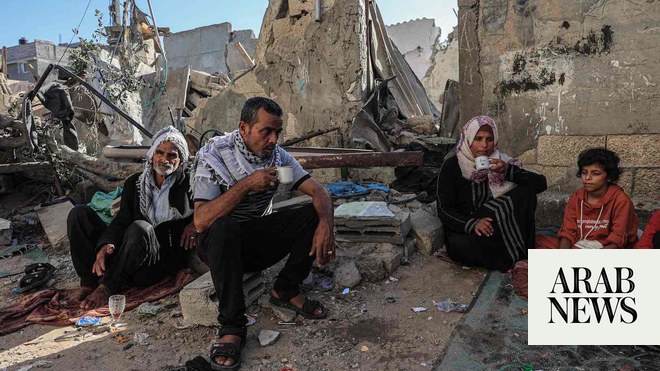
Mahnoor Ahmad accuses her opponent in the Democratic primary election, incumbent Sean Casten, of being ‘unresponsive’ to Arab and Muslim concerns
She says she wants to ensure all residents of her district in Illinois — Christians, Muslims and Jews — are equally represented and their concerns addressed
CHICAGO: Mahnoor Ahmad, a Muslim candidate for US Congress, said the need for “more humanity” in the response to Israel’s war on Gaza is a key issue in her campaign.
She told Arab News she is hearing more and more Americans say they want a ceasefire in Gaza, that this has nothing to do with their politics, and that innocent people are being victimized “by the worst of humanity.”
She is not afraid to say what needs to be said to help achieve peace and end the violence, she added, and accused her opponent in the Democratic Party primary election for Illinois’ 6th Congressional District, due to take place on March 19 next year, of being unwilling to do the same.
“We can’t just turn away,” Ahmad said. “It has become internationally embarrassing to do that. Every part of the world is rising up and turning against what Israel’s government is doing. We cannot go on like this. It is unsustainable to be with the status quo right now. Nothing good can come out of this.
“That is something we need to address as human beings. This is a human rights issue. This is nothing about Jewish or Muslim, or Palestine or Israel. This is nothing to do with that any more. It has gone far beyond that. This is an issue that needs to be addressed peacefully.
“And as America, a country of democracy, we should be the ones who initiate that. We should be the ones saying that we are the ones that represent peace. We are a true democratic state and we will not take part in the continuing bombardment of children or women.”
Describing the images of the violence against Palestinians and Israelis since the conflict began on Oct. 7 as “horrific” she said: “Is that the plan, to keep on bombarding these children, these women? More than half, two-thirds of these are children.”
Ahmad rejected any suggestion that she is anti-Israeli, pro-Hamas or opposes peace. The 6th Congressional District, which she hopes to serve in the House of Representatives, has one of the largest concentrations of Arabs and Muslims in the country, she said, and they deserve proper representation.
Ahmad’s family moved to the US when she was 7 years old, and she graduated with a masters degree in health from Purdue University. Her father is Pakistani and her late mother was an Arab.
Her opponent in the Democratic primary, incumbent Sean Casten, supported House Resolution 888, which affirms “Israel’s right to exist” and conflates criticism of the Israeli state with a form of antisemitism. The resolution excluded any reference to Palestinian, Arab or Muslim rights. He did support calls for a “pause” in Israel’s military campaign targeting Hamas in Gaza, which has so far claimed the lives of more than 16,000 people, including about 6,000 women and children, according to Palestinian authorities.
Ahmad said that by ignoring the suffering of “all of the civilians,” Israeli and Palestinian, Casten is out of touch with his district’s residents and with “humanity.”
She also accused him of being “unresponsive” to the concerns of his constituent on other issues closer to home, including high healthcare costs.
Ahmad said her goal is to ensure that “every person of every race, religion and ethnicity” can come to her office and is free to speak out about the need for more humanity when dealing with a range of issues.
“I am 100 percent generated by the people, especially by the people of the district, by refusing to take money from corporations and being completely dedicated to the people, who I have to listen to,” she said. “(The corporations are) not who you should have to listen to.
“When we are elected, we represent the people and when you represent the people it has to be through and through: everyone, regardless of race, religion, ethnicity or national origin. I will speak to and listen to everyone in the district.
"I grew up in this area. This is home for me. This is my district, these are my people. They are not just voters to me, these are actual people that I have connected deeply with.”
Ahmad said that while the humanitarian crisis in Gaza and the killing of civilians there is currently a major concern, as a prospective member of Congress she is also very concerned about local and international issues including crime, healthcare, the economy, and the environment and climate change.
Healthcare in particular is a major issue that has yet to be fully addressed in the 6th District or nationwide, she added, and it must be more affordable for all residents, especially senior citizens, because currently the costs medicine and treatment are often out of the reach of many Americans.
“People can’t afford that,” she said. “Elderly people can’t afford dental care, which can cost thousands per month. There are elderly people who experience pain and can’t go to pain management and rely on pain-management medication … these are severe issues in our district and we need to be more aggressive in addressing and changing them.”
There is a “health crisis” in America, Ahmad said, adding: “Congress should be approving legislation, not blocking laws that could expand healthcare to citizens who are facing a healthcare crisis … we need to elect people whose hands are not tied to (health industry) corporations or anything like that, and are voting no against all the right legislation, so that we can do something about this health crisis.”
Casten has helped to block legislation that could expand access to affordable healthcare, she added.
Ahmad also supports changes to the law designed to prevent the “double taxation” of social security payments to the elderly, which she said Casten has not backed.
She said older people are “frustrated” by the failure of Congress to fully address their concerns and added: “We have to treasure our senior citizens. They are our parents. We have to keep them safe. They are a vulnerable community.”












